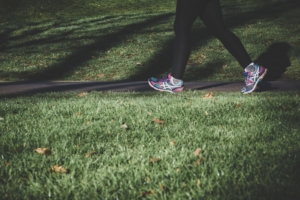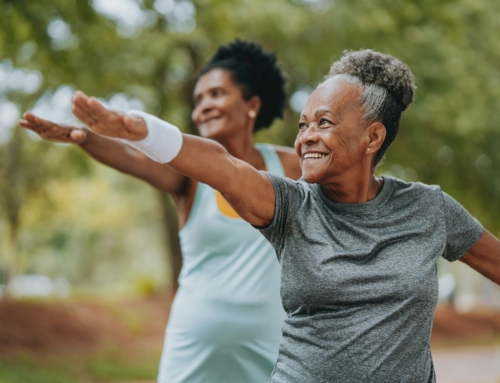Stress. It may be the word that best explains where the average person is operating on a daily basis. Our modern world has placed a heavy emphasis on doing, often at the expense of being. This pressure to do – perform, achieve, create, output – contributes to the high-stress frequency at which so many of us operate. It is easy to feel that this anxious and exhausted headspace is inevitable.
 When we experience a stress response, our body is reacting to perceived danger. This danger can include a threat to physical safety, emotional well-being, relational belonging, financial security, or any other way one might feel unsafe. For many people, stress exists like a constant pulsation that may grow softer or stronger but is always there.
When we experience a stress response, our body is reacting to perceived danger. This danger can include a threat to physical safety, emotional well-being, relational belonging, financial security, or any other way one might feel unsafe. For many people, stress exists like a constant pulsation that may grow softer or stronger but is always there.
This tension is telling our brains that we are not safe enough to relax and therefore keeps our minds and bodies in a state of fight or flight. In response, our adrenal glands release the hormone cortisol.
Cortisol “alters immune system responses and suppresses the digestive system, the reproductive system and growth processes. This complex natural alarm system also communicates with the brain regions that control mood, motivation, and fear” (Mayo Foundation for Medical Education and Research, 2021).
High levels of cortisol are detrimental to health and often have immediate and long-term consequences to well-being. Not only, then, is stress unpleasant to experience regularly, it also contributes to ongoing mental and physical health issues.
5 Effective Stress Management Techniques
The wonderful news is, we do not have to go through life gritting our teeth and feeling this way. Research has shown that there are many relatively easy ways we can reduce stress and replace this buzz of anxiety with a sense of calm and control. This article delves into five stress management techniques that can provide relief for those who are tired of this unrelenting tension.
Mindfulness
Strategy number one: Mindfulness. Some may hear this word and immediately their defenses go up. They associate mindfulness with a vague, New Age version of spirituality. While certain individuals may interpret it this way, it is something far more helpful and concrete.
 The Oxford English Dictionary defines mindfulness as “a mental state achieved by focusing one’s awareness on the present moment, while calmly acknowledging and accepting one’s feelings, thoughts, and bodily sensations, used as a therapeutic technique” (“Mindfulness,” n.d.).
The Oxford English Dictionary defines mindfulness as “a mental state achieved by focusing one’s awareness on the present moment, while calmly acknowledging and accepting one’s feelings, thoughts, and bodily sensations, used as a therapeutic technique” (“Mindfulness,” n.d.).
Put simply, mindfulness allows us to live with awareness in the moment. Being truly in the moment is the opposite of stress, which requires us to consider the “shoulds,” “should nots,” and “what-ifs” of the past and future on loop. Stress keeps us in the land of the hypothetical rather than allowing for calm in the present moment.
In Matthew 6, Jesus teaches His followers not to worry about troubles of the future; instead, we are called to live each day as its own, resting in the promise that God already knows our needs for every day to come. Mindfulness is an excellent way to do this. We can practice mindfulness by becoming aware of our bodies with reference to the space we are in.
Guided mindfulness meditations encourage those listening to notice such sensations as feeling their feet on the floor, being aware of how their thighs feel against the chair, noticing what sensations they are experiencing in their torso and back, observing how their hands feel against the armrests, and tuning into what feelings are occurring in their neck, jaw, and face.
Practicing these kinds of exercises helps us to become more aware of what we are feeling in the present moment. In doing so, we grow in our ability to be and begin to feel less pressured by the modern belief that doing determines personal value.
Intentional Breathing
Another strategy to reduce stress is intentional breathing. God designed our bodies in such a beautiful way that we do not have to think about breathing for our lungs to keep working in this way. Breathing is, of course, essential to survival as it is how oxygen is transferred to the blood and throughout the body (Cleveland Clinic, 2018).
There is, however, a great deal of benefit to practicing intentional breathing as well. Intentional breathing involves being aware of our breath as we inhale, hold, then exhale. An easy way to do this is through four-square breathing: breathe in for four seconds, hold for four seconds, exhale for four seconds, hold for four seconds, and repeat.
 This type of breathing engages the parasympathetic nervous system, which slows the heart rate and disengages the fight or flight response in our brain. Engaging in this simple technique can bring us back to the present moment and help quiet the buzz of anxiety.
This type of breathing engages the parasympathetic nervous system, which slows the heart rate and disengages the fight or flight response in our brain. Engaging in this simple technique can bring us back to the present moment and help quiet the buzz of anxiety.
Related to both mindfulness and intentional breathing, meditation has been proven to lower stress levels. In multiple lab tests, researchers found that meditation reduced cortisol production in the body and led to study participants reporting a reduced feeling of stress (Rosenkranz et al, 2013).
Meditation
Meditation is another topic that some may feel hesitant about as they associate the practice with non-Christian spirituality. While meditation is used in this way by some, that in no way excludes it as a Bible-based tool. Psalm 46:10 teaches God’s people to “be still and know that I am God.”
Meditation allows us to quiet our minds amid a chaotic world and rest in the knowledge of who God is. Many guided meditations exist, some drawing specifically from Scripture, while others focus on a more generalized approach to stress reduction. Taking a deliberate break from normal daily activities to reset our mind and body allows us to approach life from a calmer, more grounded perspective.
Movement
The fourth technique in stress management is movement. There is no denying how difficult it can be to implement regular movement into the busyness of modern life. With work schedules, family obligations, and a host of other activities that keep us busy, exercise easily takes a back seat. While busy schedules are a difficult barrier to incorporating movement, exercise of some kind is worth prioritizing.

The health benefits of regular movement are endless. Incorporating exercise reduces anxiety, improves brain functioning, helps with weight management, increases energy, and includes a host of other physical and mental benefits (Centers for Disease Control and Prevention, 2021). Many people report knowing the benefits of exercise but lacking the time or motivation to incorporate it into their schedule.
Movement can take many forms and does not have to mean working out at the gym. For some, learning yoga from the comfort of their home feels much more doable. For others, a twenty-minute walk on a lunch break works. Dancing, kickboxing, stretching, jump-roping, sports – finding what works best for you is what matters. Regular movement can drastically reduce stress and anxiety and is worth the time commitment (Centers for Disease Control and Prevention, 2021).
Scripture and Prayer
The final technique addressed here is not a technique; rather, it is an act of obedience to keep our hearts and minds aligned with God: regular time in Scripture and prayer. God calls us into a relationship with Him. If we are not consistently grounding ourselves in who He is, we can quickly lose sight of what should be most important in our lives.
A right relationship with God protects us from being consumed by the stress, anxieties, and pains of this world. Of course, this does not mean we won’t experience these difficulties. But when our heart is grounded in a relationship with Christ, our view of the world and ourselves becomes properly oriented. Only through the lens of God’s promises can we truly experience peace.
All these forms of dealing with stress can help us experience greater calm and prevent stress from sitting in the driver’s seat of our lives. Incorporating mindfulness, intentional breathing, meditation, movement, and, most importantly, consistent time in Scripture and prayer, allows us to keep our minds and bodies in the present moment and reduce the role of anxiety and tension in daily life.
For some, these techniques may be helpful, but more is needed. Experiences of trauma, unhealthy family dynamics, grappling with mental health diagnoses – struggles like these often require a deeper level of care and processing. If this is the case, it is extremely beneficial to pursue support from a mental health professional.
Christian Counseling for Stress
As a Christian therapist, my goal is to walk with clients as we together identify and process the sources of discomfort and pain that are robbing life of joy and fulfillment. If you feel therapy might benefit you, please do not hesitate to reach out to set up a risk-free initial meeting. I would be honored to offer support and guidance as you begin this process of healing.
References:
Centers for Disease Control and Prevention. (2021, November 1). Benefits of physical activity. Centers for Disease Control and Prevention. Retrieved January 13, 2022, from https://www.cdc.gov/physicalactivity/basics/pa-health/index.htm
Cleveland Clinic. (2018, September 14). How your lungs work. Retrieved January 12, 2022, from https://my.clevelandclinic.org/health/articles/8960-lungs-how-they-work
Mayo Foundation for Medical Education and Research. (2021, July 8). Chronic stress puts your health at risk. Mayo Clinic. Retrieved January 8, 2022, from https://www.mayoclinic.org/healthy-lifestyle/stress-management/in-depth/stress/art-20046037
Mindfulness. (n.d.). In Oxford English Dictionary (2nd Edition). Retrieved from https://www.oed.com/mindfulness
Rosenkranz, M. A., Davidson, R. J., MacCoon, D. G., Sheridan, J. F., Kalin, N. H., & Lutz, A. (2013). A comparison of mindfulness-based stress reduction and an active control in modulation of neurogenic inflammation. Brain, Behavior, and Immunity, 27, 174–184. https://doi.org/10.1016/j.bbi.2012.10.013
“Green Tree in Field”, Courtesy of Simon Wilkes, Unsplash.com, CC0 License; “Getting Steps In”, Courtesy of Arek Adeoye, Unsplash.com, CC0 License; “Morning Reading”, Courtesy of Aaron Burden, Unsplash.com, CC0 License; “How Are You Really?”, Courtesy of Finn, Unsplash.com, CC0 License











